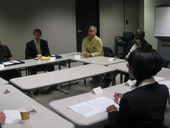Highlight
University of Colorado Denver Partners with City and County of Broomfield and National Civic League to Develop Sustainable Energy Plan
Achievement/Results
This year the University of Colorado Denver Integrative Graduate Education Research Traineeship (IGERT) program in Sustainable Urban Infrastructure formed a partnership with the City and County of Broomfield and the National Civic League (NCL) to develop a Sustainable Energy Plan for Broomfield. The overall goal of the project is to develop a baseline greenhouse gas inventory and energy futures model that will inform Broomfield officials, policy-makers, and citizens on their current carbon footprint and then to engage with the public to assess their views and suggestions on how to facilitate sustainable resource conservation. National Science Foundation funded IGERT trainees, associates, and faculty, Dr. Anu Ramaswami and Dr. Debbi Main, are leading this project as technical advisors in developing the community-wide baseline greenhouse gas inventory and tools to engage the public. They are also working closely with NCL to assist in leading public focus groups.
The baseline greenhouse gas inventory is being developed using a demand-centered, hybrid life-cycle methodology developed by Dr. Anu Ramaswami and several of her colleagues at University of Colorado Denver and the City and County of Denver (Ramaswami, et. al., 2008). This methodology incorporates direct end-use energy data as well as extra-boundary activities like air travel and key urban materials – food, water, fuel and concrete. The results of this inventory will be used to develop a climate action plan for Broomfield that will articulate technical aspects such as first cost, energy and greenhouse gas savings.
The social science aspect of this project incorporates public engagement strategies to obtain feedback from Broomfield leaders, residents, and businesses on the community’s sustainability initiative. To do this, the project incorporates three groups – a Task Force made up of 30 appointed members, a Virtual self-appointed Committee made up of 20 -25 people, and the Broomfield community at large. The community at large, and the Task Force and Virtual Committee, will be asked to give their input via focus groups and an online survey on what sustainability means to them and what their vision for sustainability in Broomfield would be. These opportunities were advertised to the community through the Broomfield newspaper and on a local access television station. The Task Force and Virtual Committee will also be presented with the results of the greenhouse gas inventory and energy futures model and asked to give feedback on the potential policy options available for carbon action and the appropriate level of policy that should be adopted. The Virtual Committee will be presented this information in an online format and then asked to complete a survey to articulate their opinion on policy formation. The Task Force will be presented the information in a meeting setting and will be allowed to have face-to-face deliberations on the policy process. All of the input from these three groups will be collated and brought together to develop the Environmental Stewardship Chapter of the Broomfield Comprehensive Plan. This Chapter will be presented to the Broomfield City Council for consideration of inclusion in the Plan.
In terms of research goals, IGERT students and faculty will compare the outcomes of the Virtual Committee and the Task Force and evaluate how the ability of the Task Force to engage in face-to-face deliberations impacted the decision-making process. This research will expand knowledge in the are of Analytic Deliberation and express for the first time assess how these deliberations can impact the decision-making process for Sustainability. Researchers will also assess the success of the public activities and continue to evaluate the methodology for conducting a city-scale greenhouse gas inventory. Additionally, researchers intend to work cooperatively with the NCL to develop toolkits that will allow other US Cities to replicate this process in developing their own Sustainable Energy Plan.
This project is very robust in that it incorporates methodologies from engineering and health and behavioral sciences and incorporates knowledge from the field of public affairs. Representation in the project includes faculty members from engineering and health and behavioral sciences and students from engineering and public affairs. The IGERT program has allowed for a venue for these students and faculty to come together to collaborate and develop research that is truly interdisciplinary.
Address Goals
This project will expand knowledge in the area of urban sustainability in that for the first time we will be assessing how allowing group to deliberate during the decision-making process on climate action and resource efficiency can impact the outcomes of that process. It will also further the knowledge base on effective public participation processes in sustainability planning initiatives. Outcomes of this research will be collated and developed in to papers for submission to peer-reviewed journals for publication and will also be submitted for presentation at national conferences. If successful, the toolkits that will be created by National Science Foundation funded University of Colorado Denver researchers and the National Civic League will be disseminated to cities throughout the United States so that they will be able to replicate the process in developing their own policies and plans. Additionally, this process engages citizens directly and therefore increases their scientific literacy in the area of sustainable urban infrastructure.






